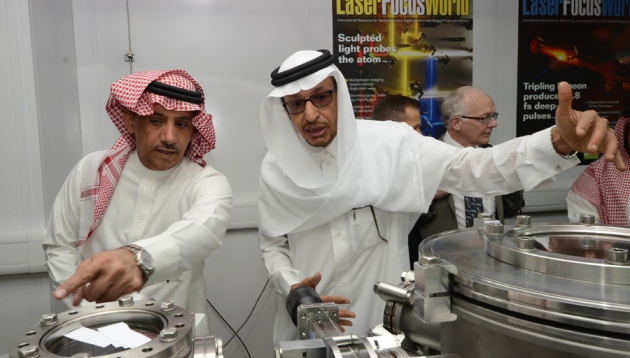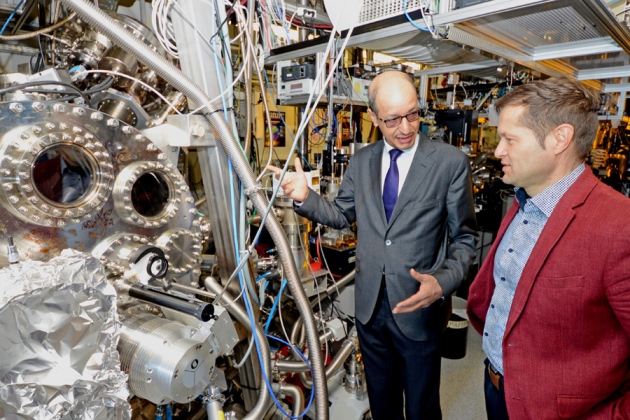
Thorsten Naeser
Rector of King Saud University, Badran Al-Omar (left), and Abdallah Azzeer attend the opening ceremony for the Attosecond Science Laboratory.
A cutting-edge laser facility — the first of its kind in the Arab world — opened this week at Saudi Arabia’s oldest and largest university. The launch pushes forward the country’s ambitions to become a leader in science and builds on a collaboration with Western scientists that has required some cultural adjustments.
The Attosecond Science Laboratory at King Saud University (KSU) in Riyadh hosts an ‘attosecond laser’, which generates ultrashort pulses of light, lasting just a few billionths of a billionth of a second, that can image otherwise invisible electrons as they move similarly fast within atoms. Attosecond lasers were invented in 2001, and facilities now exist at dozens of sites around the world. The Saudi Arabian facility is the result of a collaboration that began in 2008 with the Max Planck Institute of Quantum Optics (MPQ) in Garching, Germany, which hosts its own attosecond laser, and the Ludwig Maximilian University of Munich.
“It is very exciting that the frontier of attosecond science is now having its outpost in the Gulf state,” says Olga Smirnova, an atomic physicist at the Max Born Institute in Berlin.
Saudi Arabia is known for its oil wealth, and in 2002 its government decided that science was the key to incubating a more diverse economy. Its strategy comprises heavy financial investment and forging partnerships with leading research institutions abroad — and it seems to be working. In the past five years, the number of scientific papers produced by researchers in Saudi Arabia has skyrocketed. The quality of the research has now overtaken that of Turkey and Iran, according to impact metrics known as SNIP (Source Normalized Impact per Paper) from the University of Leiden in the Netherlands. Prince Turki Bin Saud Bin Mohammad Al Saud, who heads Saudi Arabia’s National Science, Technology and Innovation Plan, told Nature’s News team that science funding has been doubled from this year and that the country is on track to reach Western levels by the mid-2020s.
Attosecond lasers quickly became fundamental tools in atomic physics after the first attosecond laser pulses were reported in 2001 by a team led by the MPQ’s Ferenc Krausz, who heads the Attosecond Science Lab (M. Hentschel et al. Nature 414, 509–513; 2001).
The lasers have since moved into the realm of molecular sciences, including condensed-matter systems and molecular biology, where they are being used to investigate how the movement of electrons can initiate changes in the structure of molecules. “They provide an exquisitely sharp temporal scalpel for dissecting the inner workings of matter,” says laser physicist John Tisch of Imperial College London.
One of the first planned experiments for the KSU laser will study the behaviour of electrons in atoms of melanin, best known as the pigment that protects skin from the sun’s ultraviolet rays. No one knows why ultraviolet photons do not normally break the chemical bonds in the molecule when they hit it, but it is assumed that melanin’s electrons redistribute — and diffuse — the energy among themselves. The experiment at KSU will test this hypothesis by developing extremely short, high-intensity ultraviolet pulses to excite the electrons, and will then capture their movements with the attosecond laser.

Thorsten Naeser
Abdallah Azzeer (left) and Ferenc Krausz head up a collaboration at King Saud University in Riyadh.
The collaboration with Saudi Arabia gives Krausz the chance to enter totally new territory. He will work with oncologist Jean-Marc Nabholtz — who moved to KSU last year to head its National Comprehensive Cancer Center — to adapt the laser to generate pulses of infrared light for analysing proteins and nucleic acids in blood samples from people with cancer. The aim will be to find molecular ‘fingerprints’ that might diagnose cancers, or predict response to therapy or the future onset of a cancer.
The value of such a source of infrared light, Krausz says, is that a table-top-size laser system could be developed and used at patients’ bedsides. Currently, the only sources of such radiation are synchrotrons, which require large, expensive infrastructures. Because Krausz has little experience in this area, it would have been hard for him to obtain funding in Germany for such medical applications, he says.
The place of women in Saudi society and education, and the country’s human-rights record, have presented challenges for members of the collaboration. At KSU, which was founded in 1957, male and female students have separate campuses. No rule forbids women from entering the new lab, says Abdallah Azzeer, who leads the KSU side of the laser collaboration, but mixing of the sexes contravenes cultural norms. “We will make special arrangements to ensure their access,” he says. One possibility, he adds, might be to train female PhD students in handling the equipment so that they can supervise female undergraduates whose parents do not want them to attend mixed classes.
Krausz has had to get used to working in a segregated environment during his time at KSU. All the lectures are given in the men’s campus and beamed over to the women’s campus, and Krausz remembers being extremely startled the first time he received a disembodied question from a female student over loudspeakers.
He thought long and hard about working with Saudi Arabia, he says. As a Hungarian who left for the West in 1987 at the age of 25, he is hypersensitive to human-rights issues. But not long before he decided to collaborate with KSU in 2008, he had cancelled a trip to China in protest against a clamp-down on press freedom there, and then regretted the decision. It achieved nothing save the embarrassment of the scientists, he says, and he concluded that, in such cases, “the best thing is to talk to each other and learn each other’s problems”.
He found himself genuinely moved by the enthusiasm for science he encountered on his first visit to KSU later that year. “It felt like a small revolution was happening,” he says. “I thought about how I would have felt in the same situation in Hungary — I might have stayed

